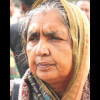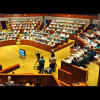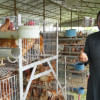A culture of disdain for farmers

A recently published editorial in the Daily Star (Middleman Take It All, 30 December 2015) has highlighted that farmers in Bangladesh are almost cut off from the market. It is well-known that while the farmers in Bangladesh not only get a much lower share of the profit from their produce but at times of good harvest and low price, may fail to recover the cost they have to bear for the production, whereas the middlemen pocket a very substantial degree of profit. Despite the growth of industrial and service sectors in Bangladesh, agriculture is still a very important sector of the economy. If we compare agriculture with garment manufacturing the most vaunted sector of the economy of Bangladesh, in terms of value addition, the role of agriculture cannot be underestimated. The economic tribulations of farmers in this country and the need for taking various policy measures and building necessary infrastructure are quite extensively documented and would not be re-told here. A relatively less explored phenomenon are the social tribulations of farmers and a bizarre attitude of neglect towards agriculture.
In many advanced economies such as in Australia, Belgium, Canada, Japan, Germany, Italy, and the USA etc., many farmers are not only mega-rich with very entrenched clout in national politics; the society's prevalent attitude towards agriculture and farmers is either somewhat romanticised or venerated. Such attitude towards agriculture and clout of agriculture lobbies have sometimes created such a perverse state of affairs where many farmers in the economically developed world receive market-distorting state aid making it difficult for farmers in the economically backward countries to compete with their counterparts in advanced economies. Of course, not everyone shares the same opinion but even those who do not harbour such a venerating attitude towards agriculture or farmers do not tend to harbour any pejorative attitude towards them. However, for strange reasons, in our country except in official policy instruments and some textbooks, agriculture and farmers are subjects of neglect at best and of ridicule at worst. Agriculture in this country is not only less rewarding in terms of economic return, but also carries low social esteem. The low social status of agriculture and farmers in this country may be epitomised by the fact that in popular parlance, often anything unsmart or stupid or naive is labelled as khyat (meaning agricultural land or an agricultural worker).
Agricultural work in this country is considered so risky and carry such low esteem that many would readily prefer to engage in clerical or even menial works in an office environment than to work even in their own ancestral agricultural lands. Part of this may be a vestige of the British rule in the Indian subcontinent. In colonial days serving the British sahibs carried so much social prestige that office workers used to be termed (and still in many Bangladeshi texts continue to be termed) as 'service-holders' implying that a job in office is a matter of holding something to be prestigious. In those days with limited opportunities of office works in the private sector, it can be assumed that the prestige of service-holding was actually a reference to work for the colonial administration. One would struggle to find the word 'service-holder' in modern English dictionaries and only linguists can tell if it was to be found in dictionaries in the United Kingdom.
Agricultural work is not only one of the earliest professions that human civilisation has seen but it also serves the most basic existential need of the human race: food. May be many of us do not live for eating, but we all have to eat to live. Most farmers in this country are cash-strapped but they are not by any means unsuccessful or less civilised than the rest of the community. After all, with modest public support and technological tools at their disposal, they are quite successful in feeding people of the mostly densely populated country (except for city states such as Macau, Monaco, Singapore, Hong Kong etc) on the planet.
Let us assume a hypothetical scenario: all farmers decide not to sell their harvests for any sort of consumption in cities. In that scenario, despite huge financial resources, advanced technologies, and civic amenities at their disposal, all city dwellers, the modern, urbanised people, will simply die of starvation.
After decades of chronic shortage of food, this country is now almost self-sufficient in many food grains and better social attitude towards agriculture and farmers could be a moral boost for many educated people to engage in agricultural work. It is never too late to accept that farmers may not be valued as sons of the soil but they are not unsuccessful or unsmart or any less than the rest of the population because agriculture is their living.
The writer is an Associate Professor at School of Law, BRAC University.

 For all latest news, follow The Daily Star's Google News channel.
For all latest news, follow The Daily Star's Google News channel. 








Comments